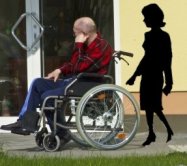lack of skilled workers in care

 You know what the attention screaming, statistics show that in Germany there is a great shortage of engineers. Germany loses annually to x billion Euro of value added, because there are too few engineers, to read as always. And also in the case of Doctors, the Situation is reportedly no better, especially in the countryside/ in rural areas there are hardly any Doctors. But how is the Situation in nursing? From personal experience I know, of course, the complaints that there are too few staff and at all corners and at the end of missing someone. That is why there are so many nurses from the East, or, as I’ve read, and recently also from more southern regions such as Portugal.
You know what the attention screaming, statistics show that in Germany there is a great shortage of engineers. Germany loses annually to x billion Euro of value added, because there are too few engineers, to read as always. And also in the case of Doctors, the Situation is reportedly no better, especially in the countryside/ in rural areas there are hardly any Doctors. But how is the Situation in nursing? From personal experience I know, of course, the complaints that there are too few staff and at all corners and at the end of missing someone. That is why there are so many nurses from the East, or, as I’ve read, and recently also from more southern regions such as Portugal.
Situation today and tomorrow
Even today, not every employer is able to fill its Spots completely. In part, nursing homes & Co can be glad, if you receive for your advertised positions at all applications. And all candidates are not then Yes also still also use. A study by the Institute of German economy (IW) argues that even in the year 2005, a nursing shortage was not disclosed until now. Also this graphic of the IW shows:

In the year 2025, so the (honest and not-too-clairvoyant) forecast of the IW, is a lack of around 200,000 care workers. The Federal Statistical office is of 152.000 lack of nurses. And another study summons in 15 years ‘ time (i.e. in 2027) even in the Absence of up to 1 Million nurses.
The two problems: young & demographics
In addressing the shortage of skilled workers, both among patients and in the care sector, there are two problems: The society is getting older and the potential young talent is becoming less and less. This graph indicates clearly the age of development in the state of Rhineland-Palatinate. Certainly the graphics can be transferred in certain statements throughout the whole of Germany.

(Source: Prof. Dr. Hennes)
It shows that there are in the future to a rapid increase of persons in need of care. And when you consider that currently, approximately 70 percent of all patient’s are cared for at home (majority of members) and this can then no longer be in the future, made possibly by the decreasing number of families increases, the number of people by leaps and bounds.
On the other hand, there is a Problem in the young generation. Now the question is why in the coming years, all of a sudden a few hundred decide of thousands of young people are carers for the elderly? There are two crucial factors that allow the professional field, not just attractive appear: The work is hard and the pay meager. Here are all of the Deal, the associations, employers, and the policy would be asked to draw a different picture. I know a lot of people, their profession, be it as a nurse or as a doctor, with big fun engage in and also your vocation. You could emphasize.
What do you think?
As always, there are also studies that don’t paint everything as black or the causes list: in Spite of these significant challenges of the future and, above all, the demand for skilled workers training in the care of the elderly has declined in recent years. Since 2003/04, the school-based training for the care of the elderly has decreased nationwide to about 41.500-of-school training places. In NRW, the training capacity in the elderly is decreased, starting in the year 2003 with then-12.599 continuously on a coupon of 9.875 in the year 2008. Everything is about but not bad? There is, however, a sufficient number of candidates for the many nursing and Doctors Jobs in Germany? Also I mentioned at the beginning shortage of engineers is hotly debated, there are many unemployed engineers, which will keep the defect to be nonsense.
What are your experiences?
Image: Uta Herbert / pixelio.de
